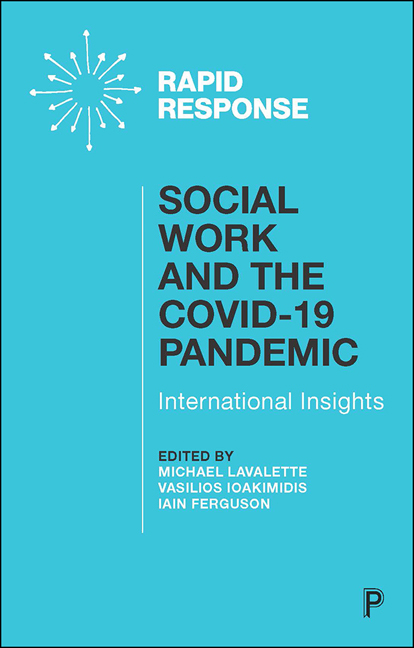10 - Social Work and COVID-19 in South Africa
Published online by Cambridge University Press: 23 March 2021
Summary
COVID-19 in South Africa
Lockdown was imposed in South Africa on 23rd March 2020 in the context of a society structured by the highest levels of inequality in the world (IMF 2020), extreme levels of poverty, hunger, inadequate housing security and unemployment. Globally, South Africa is defined as one of the emerging epicentres of hunger during COVID-19 (OXFAM 2020). The structural conditions perpetuated by post-Apartheid neoliberal macro-economic policies were “forged under the past race-based colonial and apartheid regimes” (Bhorat et al. 2020). Four months on, having embraced a stringent set of lockdown policies early on (Arendt, Robinson and Gabriel 2020), it is said that there is hope that the country will not experience the devastation seen elsewhere globally (Karim 2020). However, it is evident that the ‘peak’ of the pandemic is slowly approaching and South Africa now has the 5th highest infection rate globally (BBC 27 July 2020).
At the start of the pandemic in South Africa, the government was lauded as a ‘standout’ in the region for its early response to the pandemic, which slowed down the rate of infections. Various actions were said, early on, to have explained the relative success of the strategy; namely, what was seen to be excellent communication, leveraging of previous health crisis experience, adopting a science-based approach, working with religious and traditional leaders and unifying the political class (Devermont and Makulu 2020).
According to the chair of the Ministerial Advisory Committee, the government's early intervention delayed the peak of the crisis through the declaration of the State of Disaster and following a staged approach of gradual easing of the ‘lockdown’. It relied on a “high-level advisory committee with 51 clinicians, virologists, epidemiologists, mathematical modellers, public health practitioners, and other experts”, for advice and guidance (Karim 2020).
However, these responses occurred in the face of extreme challenges. These included the extreme levels of poverty and inequality and low trust in the government (Devermont and Makulu 2020). Preventive hygiene measures are almost impossible in vulnerable, overcrowded communities already overburdened by HIV/AIDS and tuberculosis.
Realities such as overcrowding, densely populated townships, informal settlements and shack dwellings meant that social distancing was a luxury. In many contexts, there is still no access to running water and families share communal toilets and water pumps or taps (SERI 2018).
- Type
- Chapter
- Information
- Social Work and the COVID-19 PandemicInternational Insights, pp. 73 - 80Publisher: Bristol University PressPrint publication year: 2020



